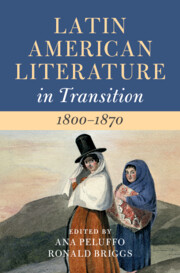Book contents
- Latin American Literature in Transition 1800–1870
- Latin American Literature in Transition
- Latin American Literature in Transition 1800–1870
- Copyright page
- Contents
- Figures
- Contributors
- Acknowledgments
- Introduction
- Part I Aesthetics of Disorder
- Chapter 1 The Paraguayan War Imagined
- Chapter 2 Networks of New World Authority
- Chapter 3 Artisans and Affective Labor
- Chapter 4 Reading (in) the Streets
- Chapter 5 Publicity and Print Culture
- Chapter 6 Literature and Political Corruption
- Chapter 7 Emotions and Politics in the Era of Caudillos
- Part II Affective Communities
- Part III Intersectional Subjectivities
- Part IV Transoceanic Consciousness
- Index
- References
Chapter 1 - The Paraguayan War Imagined
from Part I - Aesthetics of Disorder
Published online by Cambridge University Press: 24 January 2023
- Latin American Literature in Transition 1800–1870
- Latin American Literature in Transition
- Latin American Literature in Transition 1800–1870
- Copyright page
- Contents
- Figures
- Contributors
- Acknowledgments
- Introduction
- Part I Aesthetics of Disorder
- Chapter 1 The Paraguayan War Imagined
- Chapter 2 Networks of New World Authority
- Chapter 3 Artisans and Affective Labor
- Chapter 4 Reading (in) the Streets
- Chapter 5 Publicity and Print Culture
- Chapter 6 Literature and Political Corruption
- Chapter 7 Emotions and Politics in the Era of Caudillos
- Part II Affective Communities
- Part III Intersectional Subjectivities
- Part IV Transoceanic Consciousness
- Index
- References
Summary
José Ignacio Garmendia starts his Memories of the Paraguayan War (1884) with a complaint: “La historia íntima de la Guerra del Paraguay aun [sic] no se ha escrito” [the personal history of the Paraguayan War has not yet been written] (7). Like many other participants in the war, Garmendia is disheartened by a historical portrayal made out of laconic reports and by the lack of histories remembering the anonymous heroes of the war; he laments that they do not even have “un mísero monumento que conmemore tanto sacrificio” [a lousy monument to commemorate so much sacrifice].
- Type
- Chapter
- Information
- Latin American Literature in Transition 1800–1870 , pp. 19 - 37Publisher: Cambridge University PressPrint publication year: 2022

